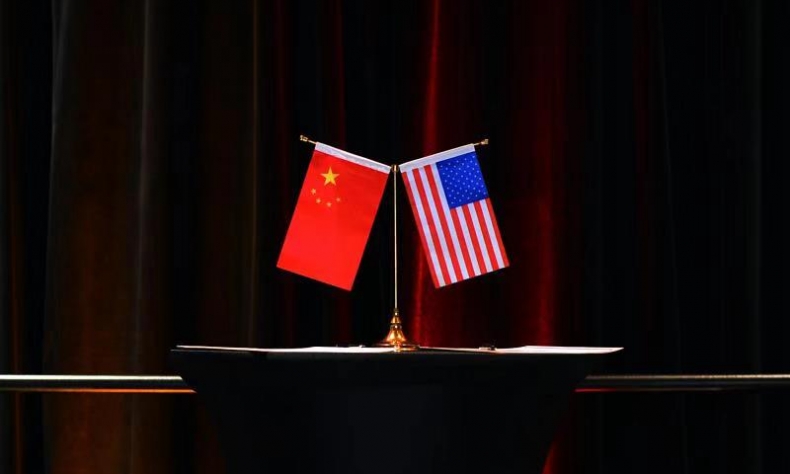Lessons from History

Compared with the Chanyuan Treaty of Alliance, the section of history since the bilateral Sino-U.S. diplomatic relationship was officially established in 1979 has more to offer: Both sides stand to gain from cooperation and lose from confrontation.
Themed on advancing the Global Security Initiative and jointly safeguarding peace and development, the Beijing Xiangshan Forum Webinar 2022 took place on December 1-2. Participants from 14 countries and one international organization focused their discussions on six topics, including Asia-Pacific stability and peaceful development, and the impact of regional conflicts on global security.
The term “Thucydides trap,” which refers to the idea that an ascending world power is destined for conflict with an existing power, was first introduced by Graham Allison, founding dean of the Kennedy School of Government at Harvard University. Telling of how China and the U.S. may avoid falling into such a trap during the webinar, Allison pointed to the Chanyuan Treaty of Alliance, signed between the Northern Song Dynasty (960-1127) and the neighboring Liao Kingdom (916-1125), two coexisting regimes in north China, in 1005. In this confrontational partnership, the two sides agreed to compete fiercely in some areas while seeking cooperation in others. Allison believes this ancient wisdom needs to be applied in today’s international relations.
Carefully studying history assists both sides to maintain rational conduct and familiarity with one another can help avoid misjudgment of current situations.
The root cause of current tensions between China and the U.S. is that the U.S. is taking action to try to contain China’s development and to hold onto its unilateral supremacy. However, history shows that harmony is etched into China’s DNA and the Chinese people find it hard to understand other countries’ anxieties over the Thucydides trap. A striking example in history is how exploration by Western countries led to colonization while China’s exploration in the 15th century resulted in prosperous overseas trade.
China boasts thousands of years of history while the U.S. has only been independent for 246 years. As the two encounter each other at the crossroads of human history, both must undergo certain tests. The evolution of civilization reveals that human beings naturally seek peace and a better life and the two countries should not deviate from this mainstream trend of human development.

History may provide useful lessons for smoother international relations in the contemporary world. Nevertheless, the Chanyuan Treaty of Alliance is not a good textbook to turn to if China and the U.S. are to ease tensions.
First, although the treaty ensured peace between the Song and the Liao for almost a century, it unfairly benefited the Liao at the expense of the Song. Second, the two’s relationship was in essence different from the current Sino-American one. The treaty was reached as the Song was defending itself against aggressive territorial expansion efforts by the Liao. Although China-U.S. relations are currently in need of improvement, the two are not yet locked in similarly deep conflict.
China believes the two countries should stick to a cooperative and reciprocal relationship based on mutual respect and peaceful coexistence, while the U.S. sees China as a competitor. Thus, it is clear which of them should take the bulk of the accountability for current tensions. The two countries differ from each other in history, culture, social system and development path. These differences should not become an obstacle to growing China-U.S. relations. The world will have competition, but this competition should be about learning from each other to become one’s better self and make progress together, not about taking others down in a zero-sum game.
When meeting his U.S. counterpart Joe Biden in Bali, Indonesia, on November 14, Chinese President Xi Jinping said that China and the U.S. are two major countries with different histories, cultures, social systems and development paths, and there have been and will continue to be differences between both. Under the current circumstances, China and the U.S. have more, not fewer, common interests, and it is in both sides’ mutual and fundamental interests to prevent conflict and confrontation and achieve peaceful coexistence.
Biden said that the U.S. and China have a shared responsibility to show the world they can manage their differences and avoid and prevent misunderstandings and misperceptions or fierce competition from veering into confrontation or conflict.
Allison’s suggestion to look for wisdom from history is a positive idea. However, compared with the Chanyuan Treaty of Alliance, the section of history since the bilateral Sino-U.S. diplomatic relationship was officially established in 1979 has more to offer: Both sides stand to gain from cooperation and lose from confrontation.
 Facebook
Facebook
 Twitter
Twitter
 Linkedin
Linkedin
 Google +
Google +










